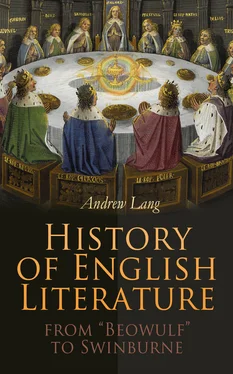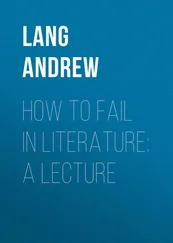Night fell, Beowulf, committing himself "to the all-knowing God," takes off his armour and lays his head on the bolster—the word is the same in Anglo-Saxon. Grendel arrived, burst in the iron-bolted door, and laughed as he saw the sleeping men. One warrior he tore to pieces and devoured; but Beowulf, who had the strength of thirty, gripped the fiend, and the hall echoed with their wrestling and stamping up and down; the clamped benches were torn from the floor. Men smote at Grendel with swords, but the steel did not bite on his body. Beowulf tore his arm and shoulder clean away, and Grendel, flying to a haunted pool, described as a terrible place, dived down through the bloodstained water, and "hell caught hold of him".
In Heorot men now made merry, and the minstrel sang a new song of the fight.
After, the rejoicings, eight horses and princely armour are given to Beowulf. The minstrel sings of the hero Finn, with a pleasant description of the coming of spring after a long winter. The poem is not all about fiends and fighting; the descriptions of wild rocks and seas, and of happy nature, are beautiful. Then the gracious wife of Hrothgar bids Beowulf farewell, giving him a cup of gold. Other presents are offered, and on so happy a day, wine, not ale, is drunk in hall.
But Beowulf s adventure is not ended. That night he slept, not in hall, but in a separate room, and the mother of Grendel, a creature more terrible than himself, came to avenge her son, and slew a warrior.
Next day Hrothgar described to Beowulf the home of the fiends; they abode in dark wolf-haunted places, windy "nesses," or headlands, wild marshlands, where the hill-stream rushes through black shadows into a pool or perhaps sea-inlet, under the earth. The boughs of trees hang dense over the water, and at night a fire shines from it. Even the stag that ranges the moors, when he flies from the hounds to the lake, dies rather than venture there to take the water. This is a fine example of the descriptions of nature in the poem. Beowulf is not alarmed; we must all die at last, he says, but while we live we should try to win glory.
So they all rode to the haunted pool, Beowulf in his iron armour and helmet. The man who had insulted him now repents, and gives Beowulf the best of iron swords, named Hrunting ; for famous swords in these days had names, like King Arthur's blade, Excalibur , or Roland's Durendal. "I will gain glory with Hrunting , or death shall take me," says Beowulf. 3
Beowulf dived into the black water, the fiend strove to crush him, but his iron shirt of mail protected him, and she dragged him into the dreadful hall, her home, where the water did not enter. A strange light burned; Beowulf saw his hideous foe and smote at her with Hrunting ; but the edge did not bite on her body. He threw away the useless sword, and they wrestled; they fell, Beowulf was under her, and she drew her short sword. She could not pierce his armour, but he saw and seized a huge sword, made for a giant in times long ago. With this he cut her down from the neck to the breast-bone, and his friends on shore saw the pool turn to blood; all but his own men had believed that Beowulf was dead, and had gone home.
Meanwhile the blade of the great sword melted away in the poisoned blood of his foe, and he swam to shore with the hilt, and with the heads of the two monsters, Grendel and his mother. With these he came gloriously to Hrothgar, who wondered at that sword hilt, covered with plates of gold, engraved with a poem in Runic letters; for the poet is fond of describing beautiful swords and armour.
Hrothgar now made a long speech about the goodness of God, which, of course, is a Christian addition to the poem. Beowulf gave back Hrunting to Hunferth, saying no word against the weapon though it had been of no service. Then they all departed in high honour, and their swift ship under sail cut the sea into foam as she flew homeward.
In time Hygelac and his son fell in battle, and Beowulf was for fifty years "the shepherd of the people". The last adventure of his old age was a fight with a fiery dragon which dwelt among the golden treasures in an ancient burial mound. In the tomb, says the poet, "there is no sound of swords or harness, no joy of the harp; the good hawk flits not through the hall; the swift horse does not beat the ground at the gate". Anglo-Saxon poetry is full of the melancholy of death, and of mournful thoughts awakened in presence of the ruined homes of men long dead.
In his last fight and his best fight, Beowulf, with a young prince to aid him, slew the Fire Drake, but he was mortally hurt by its poisonous flaming breath, and spoke his latest words: "Bid the brave men pile up a mound for me, high and far-seen on the headland, that seafaring men in time to come may call it Beowulf's mound". These are almost the very words of the ghost of the dead oarsman, Elpenor, to Odysseus in Homer.
So much has been said about the poem of "Beowulf," because it is by far the greatest poem that the Anglo-Saxons have left to us, and best shows how they lived. From "Beowulf" we learn that our ancestors lived almost exactly as did the ancestors of the Greeks, in Homer's poems, made perhaps 1600 years before the making of "Beowulf". Both these ancient Greeks and our own ancestors had, and expressed in poetry, the same love, of life and of the beauty of the world; and the same belief that, after death, hope was hopeless, and joy was ended. Both had the same sense of the mystery of existence, and, when they took time to think, had the same melancholy. Our poetry thus began like that of Greece, and, in the end, became the rival of the greatness of Greece.
We know from broken pieces of these old songs which have come down to us that the Anglo-Saxons, like their German neighbours on the Continent, had even better stories than "Beowulf". But they have been lost, and "Beowulf" was perhaps saved by the Christian parts of it, which must have been put in by some one who wrote it over again after the Anglo-Saxons were converted: the language is like what was spoken and written about 750. One beautiful poem is "The Ruined City". The minstrel, beholding the desolation of the towers and baths of some Roman town which the Anglo-Saxons have overthrown, laments its fall and the perishable state of human fortunes. Other poems may be briefly mentioned.
In "The Wanderer" there is abundance of gloom, but it is a less noble poem than "The Ruined City," for the speaker is in sorrow, not for the griefs of all mankind, but for his own. He is an exile, homeless, in fact a tramp, Eardstapa. He has lost his lord, his patron; and dreams of his kindness, in the old happy days; and wakens, an aged man, friendless, to see the snow falling in the ocean, and the seabirds flitting with their white wings through the snow. The house where he had been young has fallen, and he laments over the ruins.
This complaint is also rueful, but it is manly. The poet calk to mind old heroes and heroines, such as Weland (remembered still as Wayland Smith, in Scott's "Kenilworth"), who suffered many misfortunes, but endured them bravely. The poem is in stanzas; each ending with the burden or refrain,
That evil he overcame , So may I this!
It is like the often repeated word of Odysseus in Homer:—
Endure my heart , Worse hast thou endured!
One sorrow of the poet is that his lord has taken from him the land which he held as a minstrel, and given it to another singer. Now he is in new trouble.
That I surmounted , So may I this!
Probably there were many other poems with refrains, or recurring lines at the end of each stanza; this is a very old poetic device; originally the refrains were sung in chorus by the listeners as they danced to the music of the minstrels.
Читать дальше












